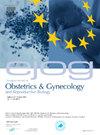Higher serum progesterone level has no negative impact on live birth rate in frozen embryo transfer
IF 2.1
4区 医学
Q2 OBSTETRICS & GYNECOLOGY
European journal of obstetrics, gynecology, and reproductive biology
Pub Date : 2024-10-09
DOI:10.1016/j.ejogrb.2024.10.011
引用次数: 0
Abstract
Optimal synchronisation between the endometrium and the embryo is key to the success of frozen embryo transfers (FET). It is achieved by administering different doses of exogenous oestrogen and progesterone (P4). The negative impact of low levels of P4 on FET has been reported, but there is a lack of knowledge about which levels are most appropriate. We aimed to evaluate whether high serum P4 levels measured on FET day affect the probability of having a baby at home. This retrospective cohort study includes 7546 FET cycles performed with hormone replacement therapy (HRT) for artificial endometrial preparation. Patients were divided into three groups according to P level on FET day (ng/mL): P4 < 20(n = 6623), P4 ≥ 20–40 (n = 770) and P > 40 (n = 146). Female age was per group P4 < 20 = 38.7 ± 3.1, P ≥ 20–40 = 39.0 ± 3.0, and P4 > 40 = 38.1 ± 2.9 years old (p = 0.53). The group with the highest progesterone levels found lower ongoing pregnancy rates without statistical significance (56.3 % (P4 < 20) vs 56.8 % (P4 ≥ 20-<40) vs 51.4 % (P4 > 40); p = 0.5). Miscarriage rate was also higher, although not significantly: 16.2 % (P4 < 20) vs 15.0 % (P4 ≥ 20-<40) vs 18.0 % (P4 > 40) (p = 0.6). These findings were explored with an adjusted analysis. A higher, but not significant, odds of miscarriage was observed when P4 > 40 ng/ml, aOR = 1.14 (0.75–1.74) (p = 0.55) whereas no such association was found with P4 ≥ 20–40 ng/ml (aOR = 0.92 (0.74–1.15) (p = 0.46)). The probability of livebirth is similar when the patient was P4 > 40 (aOR = 0.77 (0.51–1.15) (p = 0.20)) than when P4 ≥ 20-<40 (aOR = 0.94 (0.79–1.11) (p = 0.47). In conclusion, women with elevated serum P4 levels on the day of FET after HRT do not find their probability of live birth impaired.
较高的血清孕酮水平对冷冻胚胎移植的活产率没有负面影响
子宫内膜与胚胎之间的最佳同步是冷冻胚胎移植(FET)成功的关键。它是通过施用不同剂量的外源性雌激素和孕酮(P4)来实现的。有报道称,低水平的 P4 会对 FET 产生负面影响,但目前还不清楚哪种水平的 P4 最合适。我们的目的是评估在 FET 日测量到的高血清 P4 水平是否会影响在家分娩的概率。这项回顾性队列研究包括 7546 例使用激素替代疗法(HRT)进行人工子宫内膜准备的 FET 周期。根据 FET 日的 P 水平(纳克/毫升)将患者分为三组:P4 < 20(n = 6623)、P4 ≥ 20-40(n = 770)和 P > 40(n = 146)。每组女性年龄为 P4 < 20 = 38.7 ± 3.1 岁,P≥ 20-40 = 39.0 ± 3.0 岁,P4 > 40 = 38.1 ± 2.9 岁(P = 0.53)。孕酮水平最高的一组的持续妊娠率较低,但无统计学意义(56.3%(P4 <20) vs 56.8%(P4 ≥ 20-<40) vs 51.4%(P4 >40);P = 0.5)。流产率也较高,但不明显:16.2% (P4 < 20) vs 15.0% (P4 ≥ 20-<40) vs 18.0% (P4 > 40) (p = 0.6)。对这些结果进行了调整分析。当 P4 > 40 ng/ml 时,观察到流产几率较高,但并不显著,aOR = 1.14 (0.75-1.74) (p = 0.55),而 P4 ≥ 20-40 ng/ml 时则没有发现这种关联(aOR = 0.92 (0.74-1.15) (p = 0.46))。与 P4≥20-<40 时(aOR = 0.94 (0.79-1.11) (p = 0.47))相比,P4 > 40 时(aOR = 0.77 (0.51-1.15) (p = 0.20))的活产概率相似。总之,HRT 后 FET 当日血清 P4 水平升高的妇女不会影响其活产概率。
本文章由计算机程序翻译,如有差异,请以英文原文为准。
求助全文
约1分钟内获得全文
求助全文
来源期刊
CiteScore
4.60
自引率
3.80%
发文量
898
审稿时长
8.3 weeks
期刊介绍:
The European Journal of Obstetrics & Gynecology and Reproductive Biology is the leading general clinical journal covering the continent. It publishes peer reviewed original research articles, as well as a wide range of news, book reviews, biographical, historical and educational articles and a lively correspondence section. Fields covered include obstetrics, prenatal diagnosis, maternal-fetal medicine, perinatology, general gynecology, gynecologic oncology, uro-gynecology, reproductive medicine, infertility, reproductive endocrinology, sexual medicine and reproductive ethics. The European Journal of Obstetrics & Gynecology and Reproductive Biology provides a forum for scientific and clinical professional communication in obstetrics and gynecology throughout Europe and the world.

 求助内容:
求助内容: 应助结果提醒方式:
应助结果提醒方式:


